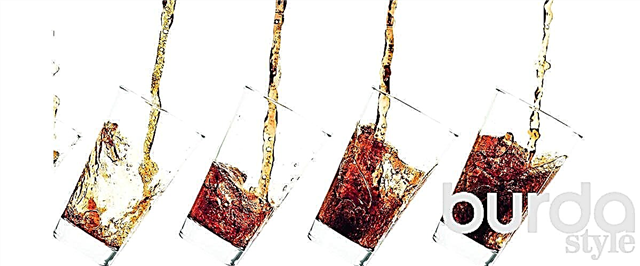About drinks that energize, we remember when you need to cope with fatigue or wake up quickly. The question is, at what cost?
One jar of energy drink replaces several cups of strong coffee: the main ingredients are caffeine and sugar. Caffeine is responsible for vigor, and so that a large dose is not bitter, add sugar. Moreover, in considerable quantities - up to 102 g, while the recommended rate is only 22 g per day. It is obvious that this makes the drink quite high-calorie, not to mention other not the most favorable effects of excess sugar. And caffeine in high concentration is not so harmless: it increases blood pressure, can cause insomnia, leads to dehydration ...
Smack of risk
On the one hand, caffeine helps to stay in good shape, cheer up when unbearably sleepy. On the other hand, too large doses of caffeine do not give energy, but take it. Moreover, the effect of a cup of coffee usually lasts no more than 1-2 hours, then there is a decline. Susceptibility to caffeine and the "long-term" of its magical effect on a particular person is genetically predetermined. But in any case, the energy tone due to the presence of gases is absorbed into the bloodstream very quickly and causes a surge of strength much longer - within 4-5 hours. And all this time the body works in an enhanced mode, at the limit of its reserves.But, as you know, the more tightly you compress the spring, the stronger and more painful the answer will be. The higher the activity and working capacity against the background of energy, the stronger the subsequent decline: drowsiness, apathy, irritability.
Theory in numbers
The average daily norm of caffeine is not more than 400 mg. This is 2-3 cups of black coffee or 5-7 cups of strong tea. A standard energy jar contains about 80 mg of caffeine. It seems not very much. But the first impression of a small dose is misleading. Manufacturers, as a rule, indicate the amount of a substance extracted specifically from coffee, while the treasured caffeine can be contained in other ingredients, and in significant doses. For example, in guarana, an essential component of energy tonics, it is 3 times more. Energotonics also contain taurine and glucuronolactone. The safety of dosages and combinations of these ingredients has not been proven, the mechanisms of their interaction with each other are unknown. It is possible that these active substances reinforce each other, and when collected in the same jar, they do constitute an explosive mixture.
 Pay
Pay
Caffeine really stimulates brain activity and improves performance. However, he:
■ to blame for heart palpitations and high blood pressure;
■ has a diuretic effect and promotes dehydration;
■ May cause cramping and abdominal pain;
■ affects the cardiovascular and nervous systems.
However, caffeine is not the whole energy industry. Yohimbine, which has an invigorating effect, increases blood pressure and accelerates the heartbeat, while theobromine accelerates the heart rate, leading to insomnia and irritability.
It is no accident that in France, Norway, and Denmark, energy drinks are equated with potent drugs, and they can only be bought at a pharmacy.
It would seem that just a cup of coffee - all these wonderful espresso, latte, Americano, cappuccino, which are traditionally used also as invigorating stimulants - has the same side effects. But this is not entirely true: firstly, the dosages vary significantly, and secondly, as a rule, coffee is drunk hot and slow. Cold energy drinks immediately and in one gulp, which means that the entire explosive mixture explodes in the blood instantly - a very significant load on all internal systems.
WHO DOESN'T?
■ Experts insist: children under 12 years of age should absolutely not drink energy. Up to 18 years old - not recommended. A relatively safe maximum for adolescents and young people is one can per day. In this case, remember the high caffeine content. This means that you should not drink coffee together with the power engineer, you will get the opposite effect, because the body’s resources are already exhausted.
■ You can not combine energy with alcoholic beverages, since alcohol enhances the effect of caffeine, causing the cardiovascular system to work to the limit.
■ Since caffeine has a diuretic effect, it is not recommended to take drinks after exercise or any physical activity due to the risk of dehydration.
■ Caffeine is usually excreted after 3-5 hours. During this time, do not use foods that enhance its effect.
■ 1-2 banks per day - this is the verdict of most doctors about the safe amount of energy. Ideally, no more than 1-2 jars per month, and even then in extreme cases. The rest of the time, you can cheer up in other, healthier ways: walking, exercise, fruit juices, tea with a piece of chocolate.
 How to recharge?
How to recharge?
Most power engineers include vitamins. Mostly C and group B. But in such a chemical company, and in huge quantities, instead of their benefits, there can also be harm. Vitamin Bwhen it is in excess, causes a rapid heartbeat and can even trigger the development of allergies. Vitamin C enters into chemical reactions with preservatives and flavorings. As a result, carcinogens may form.
Famous tonics - ginseng and mate. In small quantities, they really invigorate. But in combination with caffeine-containing plants, they overheat it, drive it in, and not push it.
So no inspirational properties should be attributed to these drinks. According to experts, these are just reinforced coffee substitutes, many times more harmful. And energizing vitamins and glucose are found in other tasty and healthy foods.
Important
Power engineers deplete the nervous system. After an explosion of activity, a respite of 3-5 hours is required.
In addition, caffeine in high doses can be addictive.
A cup of coffee or tea with a slice of chocolate, a glass of freshly squeezed juice is charged with vigor no worse than power engineers without side effects.
 The article was published on the materials of the magazine "Good advice" 7/2013
The article was published on the materials of the magazine "Good advice" 7/2013
Text: Elena Babicheva.Photo: Legion-Media; YuriArcurs/Fotolia.com
Material prepared by Julia Dekanova



